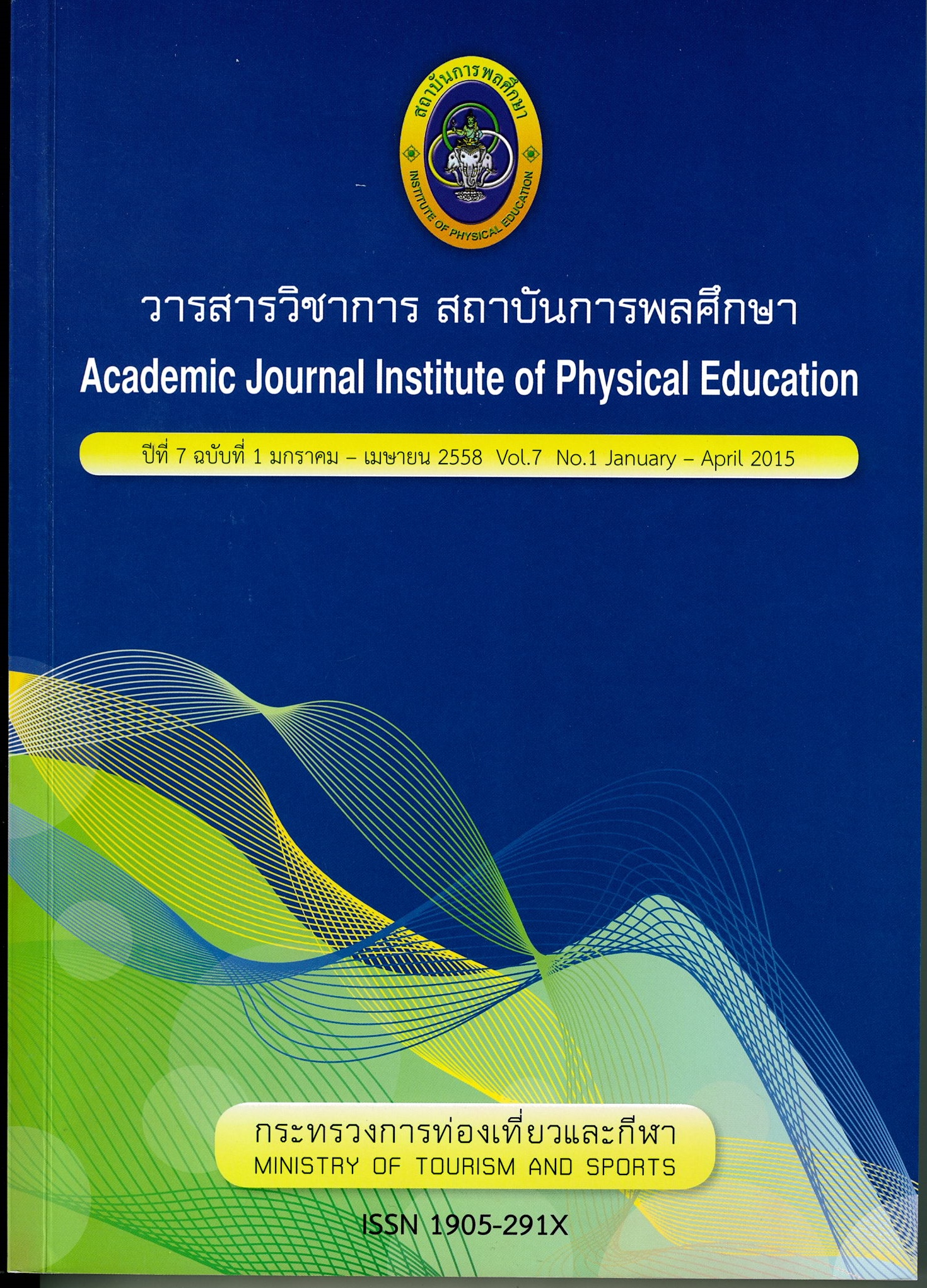The Development of Instructional Model to Enhance Chracteritics of Sports School Students
Main Article Content
Abstract
The purpose of this research was to study the desirable attributes of school sports students. The development of instructional model to enhance desirable attributes of sports school students was the key concept of the educational management to improve these students in many areas including physical, mental, emotional, social, intellectual, moral, and ethical area so that they become good citizens and could live in a society with good quality of life. The samples used in the study consisted of 1,200 students enrolled in sports schools which were registered in the Academy of Physical Education,
Ministry of Tourism and Sports and were obtained by purposive sampling. The research
tools were the desirable attributes questionnaires with five-level rating scale and the confidence level was at 0.994. The data were then collected by using booklet matrix sampling. The confirmatory factor analysis was done by using LISREL program (version 9.1, activation code OA76-3CAF-8237-FOEO)
The results showed that
- By investigating academic documents, concepts, and principles, it was found that there were 7 desirable attributes of sports school students as follows;
1.1 Morality and Ethics Skills 1.2 Social Skills 1.3 Knowledge Skills 1.4 Capability Skills 1.5 Intellectual Skills
1.6 Physical Skills
1.7 Mental Skills
- The construct validity of the survey by examining the index of consistency was as follows: Chi-Square (x2) = 582.51, Degree of Freedom (df) = 216, p-value = 0.00000, RMR = 0.042
Article Details

This work is licensed under a Creative Commons Attribution-NonCommercial-NoDerivatives 4.0 International License.
The published article is a copyright of the Academic Journal of Thailand National Sports University. The passage appeared in each article in this academic journal is a perspective of each author which is not related to the journal. Each author is required to be responsible for all components of his/her own article. If there are any mistakes, each author must be responsible for those mistakes on his/her own.
References
กระทรวงศึกษาธิการ. (2545). หลักสูตรการศึกษาขั้นพื้นฐานพุทธศักราช 2544. กรุงเทพฯ: โรงพิมพ์องค์การรับส่งสินค้าและพัสดุภัณฑ์.
กระทรวงศึกษาธิการ. (2551). หลักสูตรแกนกลางการศึกษาขั้นพื้นฐาน พุทธศักราช 2551.
กระทรวงศึกษาธิการ. (2551). แนวทางการพัฒนาการวัดและประเมินคุณลักษณะอันพึงประสงค์ ตามหลักสูตร แกนกลางการศึกษาขั้นพื้นฐาน พุทธศักราช 2551. กรุงเทพฯ: สํานักวิชาการ และมาตรฐานการศึกษา สํานักงานคณะกรรมการการศึกษาขั้นพื้นฐาน.
เกรียงศักดิ์ เจริญวงศ์ศักดิ์. (2546). ภาพอนาคตคุณลักษณะคนไทยที่พึงประสงค์, กรุงเทพฯ: ห้างหุ้นส่วนจํากัด วี.ที.ซี. คอมมิวนิเคชั่น.
นงลักษณ์ วิรัชชัย. (2542). โมเดลลิสเรล: สถิติวิเคราะห์สําหรับการวิจัย. พิมพ์ครั้งที่ 3. กรุงเทพฯ: จุฬาลงกรณ์มหาวิทยาลัย,
บุญชม ศรีสะอาด. (2553). การวิจัยเบื้องต้น, พิมพ์ครั้งที่ 8. กรุงเทพฯ: สุวีริยาสาส์สัน.
สํานักงานคณะกรรมการการศึกษาขั้นพื้นฐาน กระทรวงศึกษาธิการ. (2556) ข้อมูลพื้นฐานทางการศึกษา, สืบค้นจาก http://www.Portal.bopp-obec.info/obec 55/admin/list.
สุภมาส อังศุโชติและคณะ. (2552), สถิติวิเคราะห์สําหรับการวิจัยทางสังคมศาสตร์และพฤติกรรมศาสตร์: เทคนิคการใช้โปรแกรม LISREL พิมพ์ครั้งที่ 2 กรุงเทพฯ: เจริญดีมั่นคงการพิมพ์.
อรพินทร์ ชูชม. (2543). การวิเคราะห์องค์ประกอบ. เอกสารประกอบการอบรมการแปลผล.
Joseph F.Hair, Jr.; Willicam C. Black; Barry J.Babin E. Anderson; Ronald L. Tatham. (2006). Multivariate Data Analysis 6th ed Prentice Hall.


